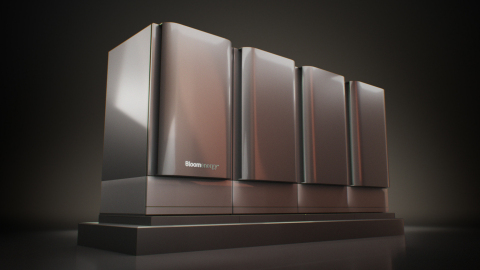SAN JOSE, Calif.--(BUSINESS WIRE)--Bloom Energy (NYSE: BE) today unveiled the Bloom Electrolyzer; the most energy-efficient electrolyzer to produce clean hydrogen to date and 15 to 45 percent more efficient than any other product on the market today.
The Bloom Electrolyzer relies on the same, commercially proven and proprietary solid oxide technology platform used by Bloom Energy Servers to provide on-site electricity at high fuel efficiency. Highly flexible, it offers unique advantages for deployment across a broad variety of hydrogen applications, using multiple energy sources including intermittent renewable energy and excess heat.
Superior Value at High Temperatures
Low-cost electrolysis has been difficult to achieve due to electricity costs, which can account for nearly 80 percent of the cost of hydrogen production through electrolysis. An opportunity has emerged, as renewable energy costs have declined precipitously over the last decade. Any reduction in electricity requirements makes hydrogen production more economical and scalable.
Because it operates at high temperatures, the Bloom Electrolyzer requires less energy to break up water molecules and produce hydrogen. As a result, Bloom Energy’s electrolyzer consumes 15 percent less electricity than other electrolyzer technologies to make hydrogen when electricity is the sole input source.
Unlike low-temperature PEM and alkaline electrolyzers that predominantly require electricity to make hydrogen, the Bloom Electrolyzer can leverage both electricity and heat to produce hydrogen. Bloom Energy’s high-temperature electrolyzer technology has the potential to use up to 45 percent less electricity when integrated with external heat sources than low-temperature PEM and alkaline electrolyzers.
“The launch of the Bloom Electrolyzer is a big leap forward in our mission to enable and empower the global hydrogen economy and a decarbonized society,” said KR Sridhar, founder, chairman, and CEO, Bloom Energy. “Hydrogen enables us to leverage abundant and inexpensive renewable energy to provide zero-carbon power, reliably—instead of intermittently. Given its efficiency and input options to make hydrogen, Bloom Energy’s electrolyzer is expected to produce hydrogen at a lower price than any alternative on the market today.”
Decarbonizing Heavy Industries
High-temperature electrolysis unlocks substantial value with heat-intensive processing applications in hard-to-decarbonize heavy industries, like steel, chemical, cement, and glass manufacturing. By utilizing excess heat from these processes, hydrogen can be produced at a higher electrical efficiency. Further, the hydrogen required to power high-temperature furnaces at these factories can be produced on-site using Bloom Energy electrolyzers, eliminating transportation and distribution costs.
Optimizing Intermittent Renewables
When the Bloom Electrolyzer is paired with intermittent renewable resources, such as wind and solar, the resulting green hydrogen provides an important storage mechanism. Hydrogen can be stored for long periods of time and transported over long distances. Alternatively, Bloom Energy’s fuel cells can convert this hydrogen to electricity, thereby providing continuous, reliable power.
Gigawatt Production and Scale
Bloom Energy began manufacturing in the U.S. in 2001 and now supports more than 1,500 American clean energy jobs. Bloom Energy’s Sunnyvale, California and Newark, Delaware manufacturing facilities are capable of producing 500 megawatts of electrolyzers today and a gigawatt within a year.
Since the Bloom Electrolyzer utilizes the same solid oxide platform as the company’s core fuel cell product, utilizing many of the same components, Bloom Energy can scale and leverage supply chain synergies.
Enabling and Empowering the Global Hydrogen Economy
Bloom Energy’s technology dates to the 1980s, when the co-founders first developed electrolyzers to support the military and later NASA’s Mars exploration programs. In the early 2000s, 19 patents were awarded to Bloom Energy for its electrolyzer technology. With reduced renewable energy costs and the global movement to decarbonize, Bloom Energy believes this is the right moment to commercialize its hydrogen technology. Collaborating with industry-leading organizations, Bloom Energy celebrated several milestones over the past year:
First announced electrolyzer pilot: In November 2020, Bloom Energy announced it will supply its electrolyzers to an industrial complex in Changwon, Korea in collaboration with its Korean partner, SK EcoPlant. Supporting the Changwon RE100 initiative to create renewable ecosystems, the new project paves the way for South Korea to reach carbon neutrality by 2050. The units will ship to Changwon in mid-2022.
Harnessing excess nuclear energy: In May 2021, Bloom Energy announced its collaboration with the U.S. Department of Energy’s Idaho National Laboratory (INL) to test the use of nuclear energy to create clean hydrogen through the Bloom Electrolyzer. Rather than ramping down power generation when an electric grid has surplus energy, the Bloom Electrolyzer can use the excess electricity and steam generated by nuclear plants to produce low-cost, zero-carbon hydrogen, providing clean energy for use when it’s needed while simultaneously offering nuclear power plants a source of revenue for their excess power. The units are undergoing testing in Bloom Energy’s laboratories and are expected to ship to INL in Q3.
Integrating hydrogen solutions: In May 2021, Bloom Energy announced a collaboration with energy technology company Baker Hughes to explore commercialization and deployment collaborations in many areas, including integrated hydrogen solutions, to advance the energy transition. The companies will look to pair the Bloom Electrolyzer with Baker Hughes’ compression technology for efficient production, compression, transport, and storage of hydrogen. They will also assess excess heat utilization for steam generation to further increase efficiency and cost effectiveness of hydrogen production and target applications like blending hydrogen into natural gas networks alongside on-site hydrogen production for industrial use.
Orders are being accepted for the Bloom Electrolyzer, with commercial shipments expected to begin in fall 2022. For more information about the Bloom Electrolyzer and the company’s commitment to a zero-carbon future, visit: www.bloomenergy.com/bloomelectrolyzer.
About Bloom Energy
Bloom Energy’s mission is to make clean, reliable energy affordable for everyone in the world. Bloom Energy’s product, the Bloom Energy Server, delivers highly reliable and resilient, always-on electric power that is clean, cost-effective, and ideal for microgrid applications. Bloom Energy’s customers include many Fortune 100 companies and leaders in manufacturing, data centers, healthcare, retail, higher education, utilities, and other industries. For more information, visit www.bloomenergy.com.
Cautionary Note Regarding Forward-Looking Statements
This press release contains forward-looking statements within the meaning of the federal securities laws that involve risks and uncertainties. Words such as “anticipates,” “could,” “expects,” “intends,” “plans,” “projects,” “believes,” “seeks,” “estimates,” “can,” “may,” “will,” “would” and similar expressions identify such forward-looking statements. These statements include, but are not limited to, expectations regarding the energy efficiency of the Bloom Electrolyzer and the cost at which it will produce hydrogen; expectations related to potential applications of the Bloom Electrolyzer, integrated hydrogen solutions and other technical solutions; expectations regarding the timing of commercial shipments of the Bloom Electrolyzer; and Bloom’s ability to successfully commercialize and scale any potential applications. These statements should not be taken as guarantees of results and should not be considered an indication of future activity or future performance. Actual events or results may differ materially from those described in this press release due to a number of risks and uncertainties, including those included in the risk factors section of Bloom Energy’s Quarterly Report on Form 10-Q for the quarter ended March 31, 2021 and other risks detailed in Bloom Energy’s SEC filings from time to time. Bloom Energy undertakes no obligation to revise or publicly update any forward-looking statements unless if and as required by law.




